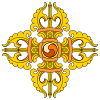
Back Phowa Czech Phowa German Phowa Spanish Phowa French ფოვა Georgian Phowa Polish Пхова Russian Пхова Ukrainian 頗瓦 Chinese
| Part of a series on |
| Vajrayana Buddhism |
|---|
 |
Phowa (Tibetan: འཕོ་བ་, Wylie: 'pho ba, Sanskrit: saṃkrānti[citation needed]) is a tantric practice found in both Hinduism and Buddhism. It may be described as "transference of consciousness at the time of death", "mindstream transference", "the practice of conscious dying", or "enlightenment without meditation"[1] (Wylie: ma-sgom sangs-rgyas). In Tibetan Buddhism phowa is one of the Six yogas of Naropa and also appears in many other lineages and systems of teaching.
Lama Thubten Yeshe taught on the subject of phowa that "We have to choose the right time to transfer our consciousness; we’re not allowed to do it at the wrong time because that becomes suicide."[2]
Outside of Buddhism "This controversial esoteric technique (Skt. utkrānti), by which a tantric practitioner is able to sever his connection to the physical body, goes by the Indian reference to 'yogic' or spiritual suicide.[1] It is referred to in many Saiva scriptures, in one Vaisnava Samhita, and a handful of Sākta Tantras.
- ^ a b Halkias (2019).
- ^ Yeshe (2011).
© MMXXIII Rich X Search. We shall prevail. All rights reserved. Rich X Search